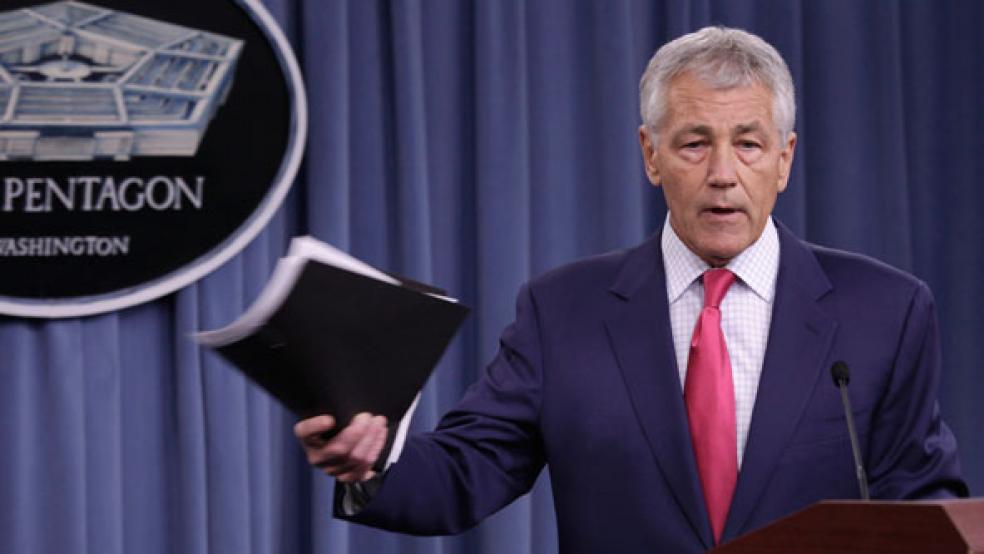Last week, the Pentagon received yet another black eye in its fight to combat sexual assaults within its ranks, as DOD prosecutors refused to try Brig. Gen. Jeffrey Sinclair for sexual harassment. Sinclair had pleaded guilty to lesser counts involving improper relationships with three women, possession of pornography while deployed to Afghanistan and mistreatment of a female captain who had been his mistress for three years, USA Today reported. Other allegations he admitted involved use of profanity and misusing a government credit card.
Advocates for soldiers who have been sexually assaulted while enlisted in the military, including Rep. Jackie Speier, California Democrat, said the punishment was too lenient for the severe charges Sinclair was originally faced with. She told the Secretary of the Army John McHugh that Sinclair was a sexual predator, and that she would lead an effort to reduce Sinclair’s retirement pay, which had already been reduced $800,000 over his lifetime.
Related: Scramjet: DOD’s New Screaming Fast Hypersonic Weapon
“For a sexual predator to gain this rank and [be] given a slap on the wrist suggests that the system doesn’t work,” Speier said.
The Sinclair matter is the latest in a series of high-profile cases in which DOD did not properly handle sexual assault allegations made by soldiers. The entire issue has become a public relations disaster for the Pentagon, according to Brian Purchia, communications director at Protect Our Defenders, a group that advocates for military sexual assault victims.
“The public and the rest of us get this,” he said in an interview. “You can’t have your boss or your boss’ friend decide whether a sex assault case goes forward.”
The continuing problems with DOD’s handling of sexual assault cases are emblematic of wider problems across the Pentagon. After nearly a decade of only good news - endless budgets and seemingly endless war - nearly all of the news being received by DOD brass is bad. Program budgets are being cut; high-ranking officers are being forced to take pay-freezes; the cost of health care and other benefit programs are being reduced; even commissaries are facing budget cuts. Last year, Defense Chief Chuck Hagel hinted that DOD might get rid of Stars and Stripes, the military paper that’s been published since the Civil War.
Related: Pensions for Vets Could Be Whacked Under Pentagon Proposal
Many of DOD’s problems stem from problems within the Pentagon. For instance, the department’s inability to pass an audit has become a bit of a running joke; the Marines were celebrated when they were finally able to put their books in order. But the lack of spending controls has allowed countless billions to disappear.
“You have a very complicated ball of wax over there moving a lot of money all the time. Even in the days of computerization, you can't assure every dollar is going down the right chute,” said Gordon Adams, a defense budget experts at American University.
Yet DOD is not solely responsible for many of the problems it’s facing. Congress has been complicit, both in funneling an endless stream of cash into DOD for the last decade, and for failing to meets in obligations as lawmakers.
The sexual assault controversy is an example of the latter. Purchia says the plan offered by New York Democrat Sen. Kirsten Gillibrand last month to remove the chain of command from sexual assault investigations -- a move that would have effectively disallowed commanding to stop investigations -- was thought to have broad support in the Senate. But Democrats and Republicans who balked at the broad overhaul of the military chain of command ultimately killed the bill.
Related: With Latest Victory, Assad Has Won the War in Syria
“You can’t expect a commander to know sexual assault training and to understand and react to [sexual assault]. Then there’s that innate broken system to begin with. If [a commanding officer] reports a sexual assault to begin with, it reflects poorly on them,” he said.
“Every day it seems like you’re hearing something that you just can’t believe,” Purchia added.
This isn’t to dismiss DOD’s role in the Pentagon’s culture problem. As Hagel has pushed for broad reform, he’s received pushback from all corners of the building. But the Army, the biggest service, has been the most resistant to change.
That’s because the changes being proposed by Hagel and President Obama would vastly reduce the size of the Army, slash program budgets, and reduce the importance of the force.
Top Reads from The Fiscal Times





